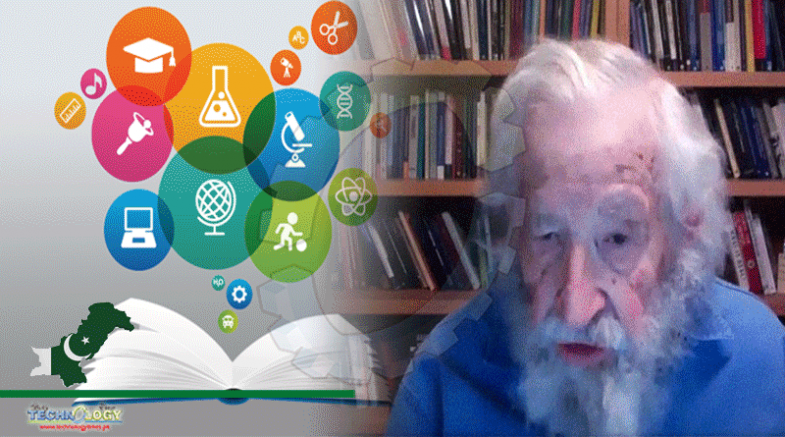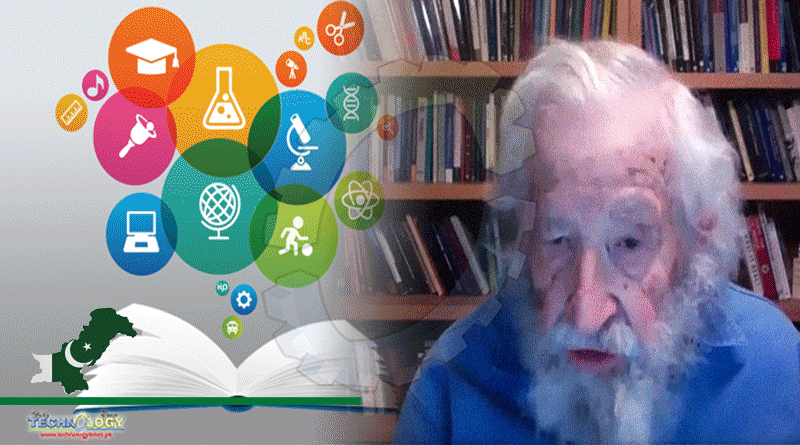Today’s generation faces questions that have never been raised before, world-renowned intellectual critic, Noam Chomsky, said Monday.

Today’s generation faces questions that have never been raised before in the human history, world-renowned intellectual and social critic, Noam Chomsky, said Monday.
“These questions are a burden and a challenge,” said Chomsky, a speaker at a virtual session — part of the Habib University’s flagship Yohsin Lecture Series — and who last visited Pakistan nearly 20 years ago.
In the lecture titled “Bullet Dodged or Merely Delayed: Reflections on the Future of Democracy, Nuclear Proliferation and the Looming Environmental Catastrophe in a Post-Trumpian World,” he spoke of the ongoing coronavirus pandemic, saying the world would come out of it “at a very terrible and unnecessary cost”.
Praising South Korea for its fight against COVID-19, he remarked that the United States, India, and Brazil had not fared well against the deadly illness.
“The American people fell victim to right-wing propaganda,” the political activist said before noting that China — with which the US is engaged in an intense tussle — was in the critical stages of testing the coronavirus vaccine.
“The Chinese vaccine may become available earlier,” he commented. “The US government is undermining the measures China is taking.”
Chomsky also lamented that Pakistan was drifting away from science but urged that science be incorporated into academics and the outlook of the world for the sake of the country’s future, .
Talking of the various other challenges in the world at present, the historian warned of how the threat of nuclear war was “growing”. Similarly, there was the climate emergency to tackle as well, he observed.
“If no action is taken, there is a risk of environmental catastrophe. South Asia faces threats from and linked to climate change,” he said.
Chomsky discussed the recent outcome of the US Elections 2020, as well as an escalated nuclear threat, fading democracy, and environmental catastrophe the world is facing today, contextualising his lecture in relation to the possible scenarios emerging in the wake of the deteriorating human condition in the 20th century.
“We are in an extraordinary situation in human history. Survival is hanging by a thread,” warns distinguished scholar.
The linguist highlighted four terminal threats to humanity: nuclear war, the environmental catastrophe, deterioration of worldwide democracy, and the recent COVID-19 pandemic — the last of which he termed was “the least of the four crises”.
With regards to an increasing and real threat of nuclear war, Prof Chomsky underscored that such an event would prove devastating not only for the countries involved but the entire world through the effects of the nuclear winter that would spread globally.
Expressing his ideas on the neoliberal world order, expansion of American democracy in the post-World War II global dispensation, and the most recent mismanagement of the pandemic, Chomsky emphasized that “the present generation is facing questions that have never arisen in human history and will never arise again unless given an appropriate answer”.
Of the US and its deteriorating democracy over the last 40 years, he pointed out that “[a] tiny fraction of the population… has doubled their share of wealth”, with 0.1% of the population now controlling 20% of America’s entire wealth.
“When you concentrate wealth to that extraordinary extent, it’s going to spill over to the way the government functions,” Chomsky noted, highlighting that the basic social structure on which a functioning democracy rests had been dismantled.
“The crises that we face today — nuclear weapons, environmental catastrophe, destruction of democracy, pandemic … and many others — have solutions,” he said.
“Autocrats and demagogues”, however, would never implement these solutions and that “it has to be an engaged, informed public in a vibrant democracy” that would tackle these issues.
He advised universities in Asia, Australia, Africa, and South America to preserve a rational educational system that dealt with the world’s realities.
Originally published at GEO
